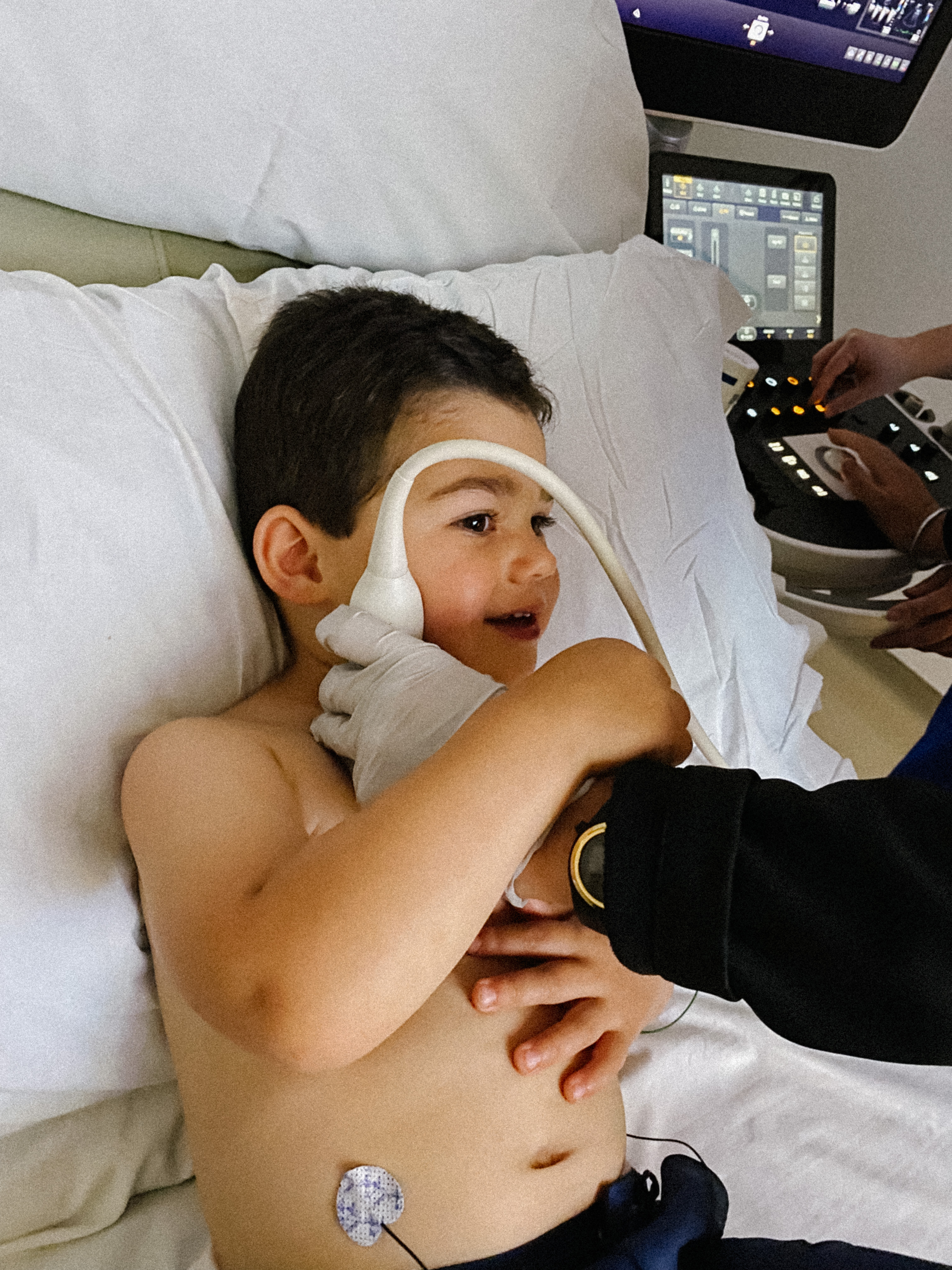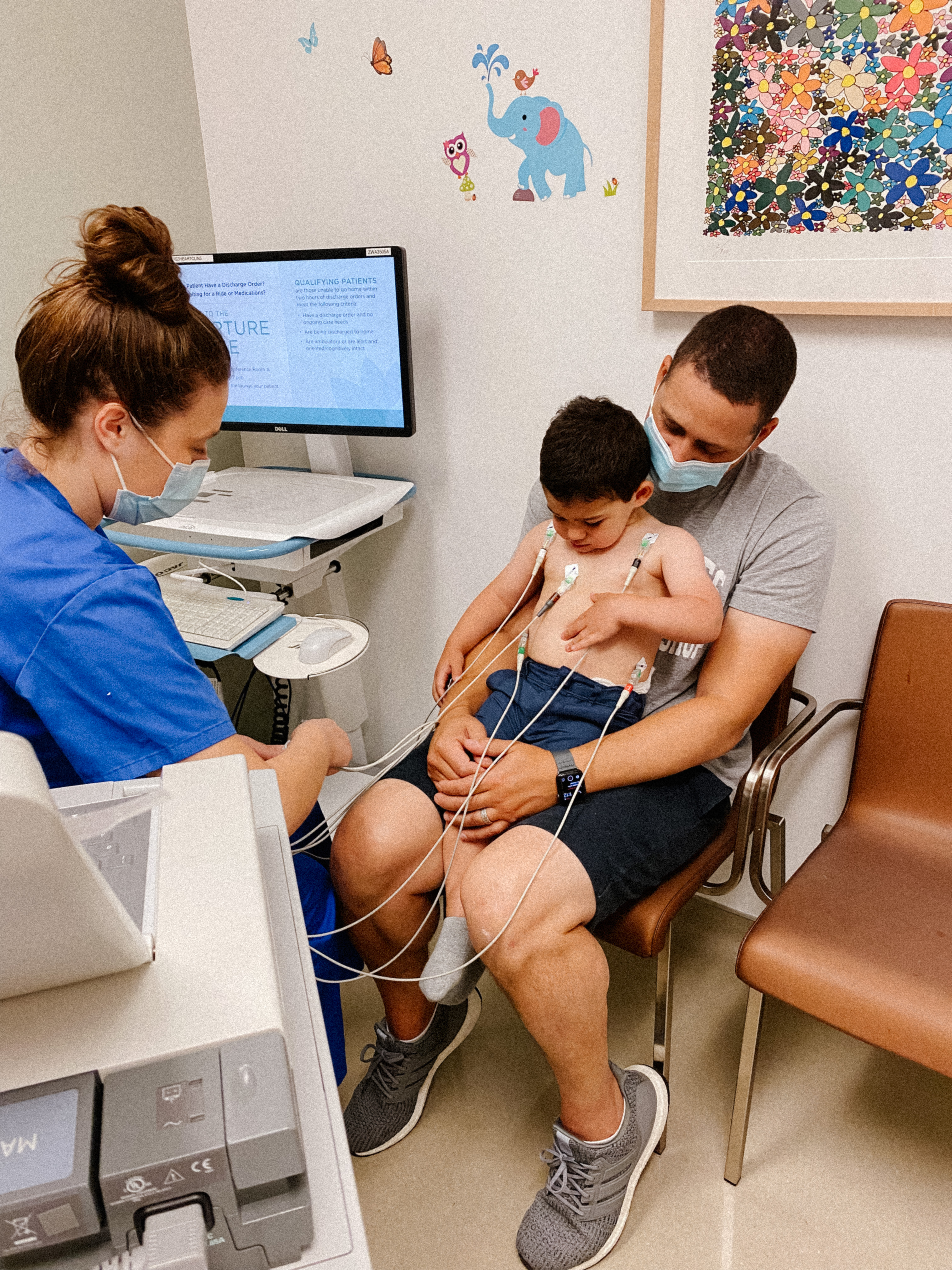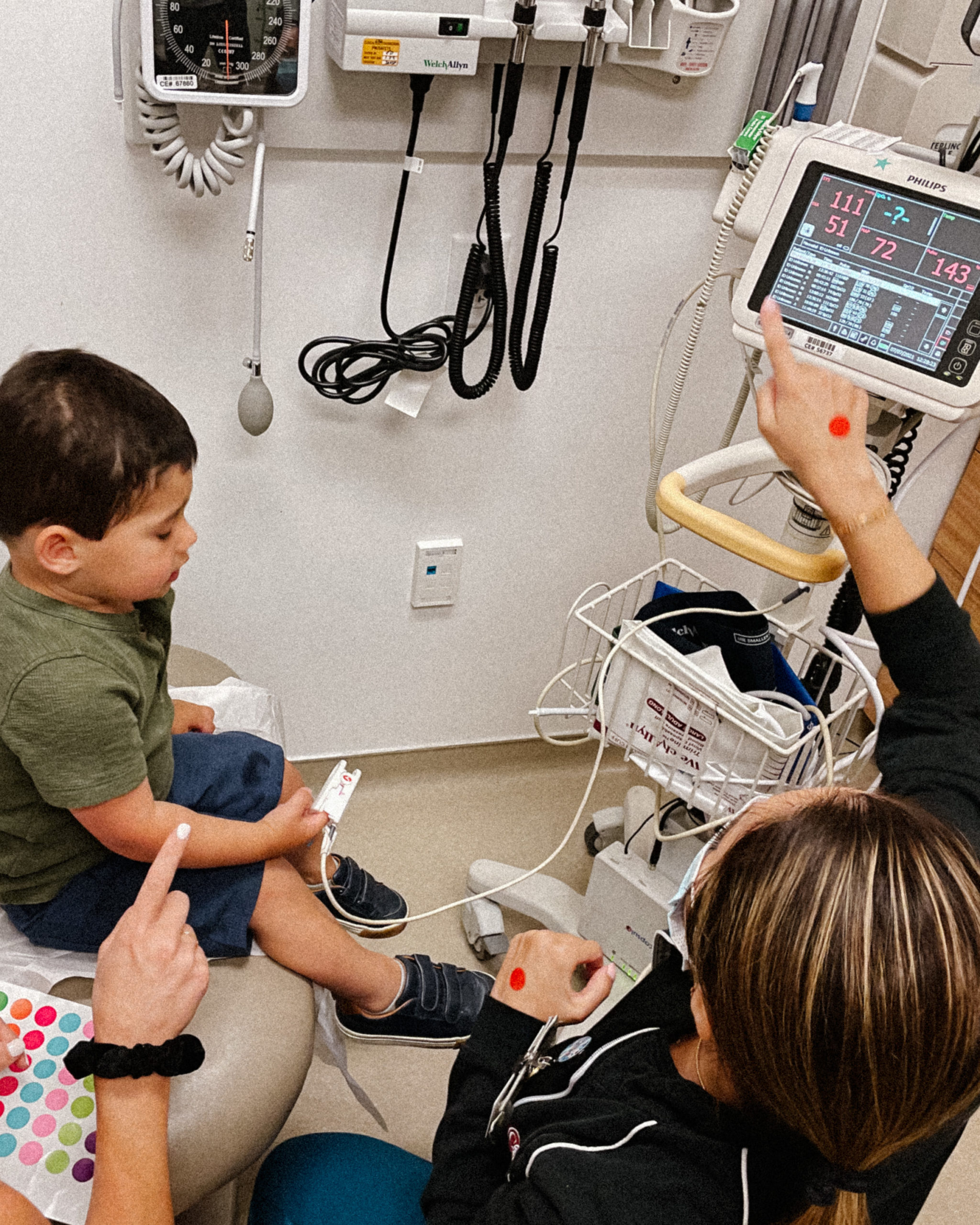
It’s that time again. Cardiac clinic day. Today we take Leyton in to see his cardiologist for a full cardiac work up, vitals, echocardiogram and EKG. It’s been almost 5 months since his last appointment, which is the longest “break” he, or we, have ever had between appointments. I’ve had a couple anxiety flare ups, shall we say, over the last few months, but honestly I’m feeling more calm and confident going into a cardiac appointment than I ever have before. Joy and even contentment feels risky, as we’ve seen how quickly it can be ripped away from us time and time again, but it’s been a year with no surprises, and I’m choosing not to give in to the fear.
Yes, we’ve had a long stretch of our boy being stable and he appears to be doing well, which definitely adds to my confidence going into today’s appointment. Another huge factor I attribute my emotional state to is having 6 months of therapy and 3 months of coaching under my belt. I’ve had time to talk through my experience and acknowledge the some of it as traumatic, which took time to accept. I felt labeling it trauma or PTSD was dramatic or meant I wasn’t grateful that he’s alive and thriving now. But calling it what it is took some of the power away and allowed me to confront my emotional struggles head on and think about his cardiac appointments more clearly.
I want to share some of the coping tactics I recently adopted that have been incredibly helpful to prepare for cardiac clinic days, both for me and for my son. Leyton is almost 2 (next month – what?!) with corrected Transposition of the Great Arteries and Coarctation of the Aorta with residual coarctation and pulmonary stenosis. You can read his story from the beginning here.

1. Focus on what I can control
I hate, hate, hate feeling helpless. Especially when it comes to my son. Standing by while my newborn was in incredible pain following open heart surgery was very difficult. We held him still through every poke and prod without being able to properly nurse him for comfort the first several weeks of his life, which makes this a HUGE stuck point for me. I’m very sensitive feeling to helpless as a mom and cardiac clinic days are like a mini exposure to helplessness. It’s 3 hours of forcing him into situations that I know make him uncomfortable and he often resists, but that I also know he needs. So instead of focusing on how much I hate that I can’t trade places with him or how scared I am that we might get bad news again, I focus on what I CAN control.
- I can pack a kick ass bag of all his favorite things.
- I can purchase new toys that I think will distract him.
- I can jot down notes of questions I want to ask his cardiologist.
- I can make sure we have a clean home to come home to after a long day.
- I can practice with him using our own stethoscope and blood pressure cuff at home.
- I can write this blog post and feel like there’s a shred of this experience that might help another family.
2. Help my child prepare for cardiac appointments
There was a time, between 9 months and 20 months I’d say, where getting Leyton to sit still during an echo was almost impossible. He cried and thrashed around so much for two appointments is a row that we hardly got any usable images and his doctor told us we might need to sedate him for the next echo. I was devastated and felt like such a failure because I couldn’t keep him calm and happy. I talked to other moms and realized it’s not uncommon to do a sedated echo at that age, which was comforting to hear. I also talked about those feelings in therapy, and I’ve given myself a break on that one. I hate the thought of my son going under sedation yet again in his short life, but feeling like it’s all my fault on top of it doesn’t make things any better for either of us. We gave him one more shot before sedation and much to our surprise, he stayed still long enough to get usable images.
That experience led me to look into other ways to help him prepare, many of which have proven very helpful for him. Before cardiac appointments we have a little routine to help him get ready.
- We talk about his appointments in detail for weeks leading up to them.
- We remind him his doctor’s name and show him pictures of him and the office. We started doing this even when I wasn’t sure how much he understood or remembered.
- We bought our own stethoscope and blood pressure cuff from Amazon and use at home for practice. The blood pressure cuff used to terrify him and while he still doesn’t enjoy it, we were able to desensitize him to it a bit.
- We read books about hospitals, doctors and cardiac babes. “My Wonder Line” by Vicky Gooden is a beautiful book that talks about surgical scars. Super Heart Hero by Samantha Kelly is another cute CHD book, and Leo Gets A Checkup by Anna McQuinn is a cute story about the doctors office. There are tons of others and you can usually find them featuring Peppa Pig, Daniel Tiger, Sesame Street, Richard Scarry or any other character your child likes.

3. Temper my expectations
I can’t tell you how many times I’ve gone into an appointment with markers for what would make it a “good” appointment already planned out in my head. That I completely made up! Based on other heart warrior’s stories or past appointments, but all it did was set me up for disappointment and fear that it meant he wasn’t doing well. I decided after the sedated echo misunderstanding that I would try to be as open minded as possible going into cardiac appointments.
It’s impossible for me to know and predict all that could come our way during a check up. We’ve had so many curveballs, I know this pretty intimately by now. So why torture myself with the idea that 6 months or a year long clearance is the “goal”? The goal is to have his team check up on his heart and take the same cautious approach we have since before he was born. When I label that the goal instead of focusing on other expectations, it’s much easier to accept any news we get at these appointments.
4. Best case, worst case, most likely
Removing all expectations and keeping a completely open mind can be very hard to do in situations where your child’s health is at stake. So, while my goal is to go in with as few expectations as possible, it’s unrealistic for me to not think about possible outcomes. When I’m anxious or worried about appointments, sometimes I latch onto a particular “what if” and I can’t get it out of my head. It’s distracting and distressing to constantly go over the same scary thought over and over.
An exercise my therapist introduced me to is asking what scenarios are best case, worst case, and most likely outcomes of this appointment. Speaking them out loud strips them of some of their power and helps to break the cycle of ruminating on certain fears.
For example, this appointment worst case would be he’s in heart failure and we need to rush him to open heart surgery (a highly unlikely outcome without major symptoms, but doesn’t stop the “what if” from entering my mind at times). The best case would be his doctor saying his heart has improved beyond expectation, they no longer anticipate further interventions and don’t need to see him again for a year (also unlikely in his case, as we’ve been told he WILL need further intervention. But doesn’t stop me from holding on to a shred of hope!). The most likely case is his heart is overall strong and the issues we’re watching are stable enough for us to buy more time before another cardiac cath or surgery. (Hint: it ended up being most likely. 🙂 )

5. Focus on the facts
I’m pretty sure it’s no secret by now that I’m a highly sensitive person and tend to feel things pretty deeply. While sometimes that trait helps me relate to others and empathize, it can also mean I focus solely on how I feel about something rather than what is actually happening. That’s another area where trauma therapy has been so helpful. I’ve learned that the intense emotions of fear, desperation, and guilt I felt when Leyton was fighting for his life made a big impact in how I process things now. Also, at the time I was physically recovering myself and experiencing the intense hormonal shifts we all do postpartum, all of which makes this a very impactful time. I need to unlearn some of the associations I made during that time and reroute new pathways in my brain. See, its science. 😛
Being back in a hospital setting with him, around the monitors and doctors and all the sights that were intimately linked to his time post-op can feel threatening and scary to me, like we might as well be right back there. But we’re not. It’s just a check up, and he’s a growing energetic toddler now. His heart has its own unique rhythm and way of working, but it is compensating and doing its job. We do these tests and check ups to keep him healthy. Those are the facts. I never want to ignore how I’m feeling or bury a thought because it feels too painful, but sometimes (like before cardiac check ups) I’m more vulnerable to getting swallowed by those thoughts, so in those moments it’s helpful to focus on the facts, not the feelings.
6. A few tips for when anxiety strikes
- Schedule a time of day to check for symptoms: When my anxiety is really bad, I compulsively check Leyton for signs his heart is working too hard. I scrutinize his coloring and scroll through photos to compare if it’s normal or not (his lips and around his nose often turn purple). I watch his breathing to see if it’s too fast or panting and I’ll obsess over how much he’s sleeping. Being mindful of these things is part of my job as a heart mom, I need to be hyper aware. But it does more harm than good when I obsessively do it all day out of anxiety. So I will “schedule” the times I check him for symptoms, usually before bath time. That way I still feel like I’m aware, but am able to do it when I’m calm and anticipating it rather than anxious and caught off guard.
- Ground myself in the moment: When I obsessively check him for symptoms and his lips are purple for instance, it sets something off in me to immediately think the worst and start preparing myself for worst case scenario. When I feel myself starting to spiral with worry, I remind myself that nothing has changed between 3 minutes ago when we were playing happily together and right now. It suddenly FEELS emergent, but that doesn’t necessarily mean it is. Unless, of course, his coloring continued to get worse or other symptoms appeared, in which case we would rush him to the hospital. But that has yet to actually happen to us since he’s been home, so taking a deep breath and grounding myself in the moment usually helps to calm me down in the moment.
- Name what I’m feeling and just allow it: I’ve mentioned this a few times so far in this post, but really it is so helpful. Just saying out loud to myself or to my husband, “wow I’m feeling SO anxious. I must be really nervous about his appointment and it’s affecting me.” helps to acknowledge what I’m feeling in a neutral way. Sometimes just acknowledging it and allowing myself to “ride the wave” so to speak, helps to nip it in the bud and stop the anxiety from lingering in the background for weeks on end which happens when I try to distract myself or ignore the feeling until it gets worse.
And sometimes, none of that works. Sometimes I just feel anxious because these are big scary things we’re facing and I wish it were different. I don’t always feel that way, in fact I’m proud that most of the time these days I’m pretty level headed about CHD and the path it paved for us. The worst thing I can do when I’m feeling anxious is get down on myself or feel guilty for feeling that way. I don’t have to find the silver lining in every single moment or feel bad for feeling bad. If I’ve learned anything through all of this it’s that it’s highs and lows, and no two feelings are mutually exclusive.
Ok so I did it again. I set out to write a quick and helpful post with tips on preparing for cardiac appointments and I wrote a dang novel. If you’re still here, I appreciate you and I hope you found some nuggets that resonated with you. Know that you are the best parent or loved one for your little one and we can handle so much more than we think we can. <3

